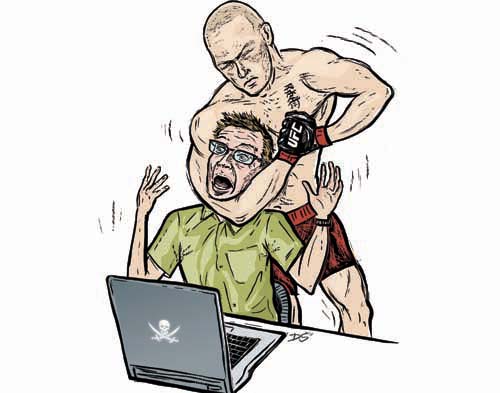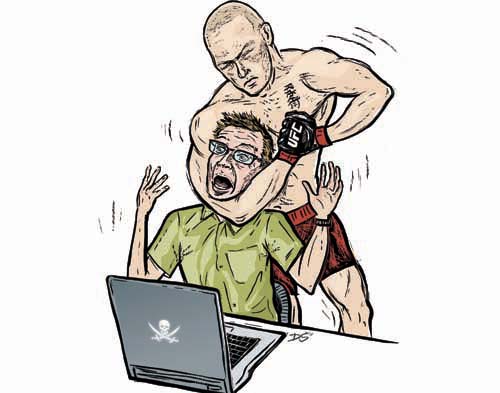UFC takes on online pirates in tough fight
The Ultimate Fighting Championship has a well-earned reputation as the baddest sport on the planet. But away from the octagon, its parent company, Zuffa LLC of Las Vegas, is becoming just as widely known for savage beat-downs.
The company, facing massive losses from Internet piracy, is aggressively pursuing those who illegally stream video of UFC fights, suing operators of third-party websites and filing subpoenas to get Internet protocol addresses of those who post copyrighted material.
"It's an illegal situation that is costing us millions of dollars a year," said Ike Lawrence Epstein, Zuffa's executive vice president and general counsel. "It's very valuable content that they are illegally pirating."
Epstein does the math: Pay-per-view for an average fight costs $50. An estimated 15,000 to 20,000 people watch each fight without paying. There are about 30 live events per year
Bottom line: a roughly $30 million annual loss.
But how can one company patrol the entire Internet?
Zuffa will sue Internet pirates and is lobbying lawmakers in Washington for tougher anti-piracy laws, but Epstein said he's also hoping to change the way the general public looks at material on the Internet.
"At the end of the day, we can't sue our way out of this problem," Epstein said. "Our goal is to change the behavior of law-abiding people who may not realize the impact of what they are doing."
That may be the UFC's toughest fight yet.
SUING OVER STREAMING
"Piracy is a worldwide problem," said Marketa Trimble, associate professor of law at the William S. Boyd School of Law at the University of Nevada, Las Vegas. "The problem is society is drunk from using the Internet."
Trimble said people are accustomed to getting most of their online content for free. She notes that many of the pirates are 15-year-olds who can't afford a $50 UFC pay-per-view.
"They say, 'Isn't this great? Everything should be free,' even if they are watching a movie illegally," she said. "A lot of people online believe movie studios such as MGM or Disney are trying to extort money from everybody."
But whether viewers feel that paying for entertainment is extortion or they simply can't afford it, the practice is illegal, Trimble said.
Plenty of companies have tried to spread the message that copyright infringement is illegal. Nevertheless, millions of Internet users continue to break the law.
Cracking down on Internet piracy isn't easy, since a multitude of websites encourage individuals to post content. There is no charge for the posting; the sites make money through subscription fees, advertising, or both.
One of many such sites is Justin.tv, which allows anyone to create an account, then post live streaming video of anything and everything -- from a self-made video of a high school football game to a UFC pay-per-view broadcast.
Justin.tv posts terms of use that prohibit streaming someone else's copyrighted content. But Zuffa says the site doesn't follow through by stopping users from posting pirated material.
In July 2010, Zuffa tried to subpoena the website to get the names of users who were posting illegal UFC broadcast streams. Zuffa recently amended the lawsuit filed in District Court in Las Vegas over what it calls "Justin.tv's repeated and ongoing failure" to police the illegal uploading of video of live pay-per-view events by its site users.
The lawsuit, originally filed in January, has yet to reach court. Justin.tv has not responded to Zuffa's original or amended complaints.
San Francisco-based Justin.tv didn't respond to email requests for comment, and the company's attorney, Brian Mendonca, declined to comment.
"Zuffa has attempted to work on numerous occasions with Justin.tv to encourage it to prevent or limit its infringing activities," Zuffa said in its 32-page complaint. "Zuffa had hoped to persuade (it) to stop its unlawful conduct without burdening the courts or itself with unnecessary litigation. However, its efforts to achieve this for nearly two years have not resulted in any satisfactory changes."
Epstein said the lawsuit was an "important part" of the company's strategy to fight the illegal distribution and viewing of its programming.
MONITORING THE INTERNET
Although it's illegal to pirate and post UFC material, the liability of a website like Justin.tv isn't as clear. The 1998 Digital Millennium Copyright Act provides certain safe-harbors for Internet companies.
When a website's content is user-generated, the website itself is not responsible if it complies with certain requirements, including acting "expeditiously" to remove infringing material after being notified of its presence on the site.
The safe-harbor provisions of the act are crucial to the survival of sites such as Justin.tv. Those provisions place the burden of finding illegal content on the companies, which then must send the website a "takedown notice" identifying the content.
UFC is not only is losing millions of dollars in revenue, it most also cover the cost of monitoring how its content is being used. Epstein said that at every UFC event, law enforcement agents and Zuffa staff monitor the Internet for illegal use of the company's content.
GOVERNMENT STEPS IN
As more companies seek to stop the loss of content and revenue from Internet piracy, enforcement of copyright laws has increased and legislation increasing the penalties for pirates is being debated in Congress.
Federal law enforcement agencies have also intensified efforts to combat the problem with a yearlong campaign to seize domains and prosecute their owners for illegally posting copyrighted material.
Last month, U.S. Immigration and Customs Enforcement announced that its Homeland Security Investigations unit had seized the domain names of five websites said to be used in the sale of counterfeit goods or illegal distribution of copyrighted materials, including media content.
"American business is threatened by those who produce counterfeit trademarked goods and pirate copyrighted materials," said Immigration and Customs Enforcement director John Morton, adding that the initiative will continue throughout this year.
The crackdown, "Operation In Our Sites," has yielded the seizure of domains for 125 websites since it began last year, U.S. Immigration and Customs Enforcement said.
Of the seized website domains, 25 were illegally hosting or linking to copyrighted media content, the federal government said. Seventy-six of the domains were forfeited to the federal government, authorities said.
Seizure and forfeiture of domain names have been the toughest penalties faced by pirates, but Morton said operators will start facing criminal charges as efforts continue to "disrupt the ability of criminals to purvey ... copyrighted materials illegally over the Internet."
Besides enforcing copyright laws, Epstein said Zuffa is lobbying in Washington to get tougher penalties for illegal use of copyrighted material. One pending proposal, Senate Bill 978, sponsored by Sen. John Cornyn, R-Texas, would make it a felony to illicitly stream copyrighted materials such as movies, music and even cage fights.
Another pending bill, sponsored by Sen. Patrick Leahy, D-Vt., would make it possible to deny access to "pirate" or "rogue" websites, especially those registered outside the United States, that post copyrighted material.
BILLIONS OF DOLLARS LOST
Leahy said copyright infringement and the sale of counterfeit goods reportedly cost the U.S. economy billions of dollars and hundreds of thousands of jobs, along with billions of dollars in lost tax revenue for federal, state and local governments.
Opponents of the crackdown say the federal government shouldn't side with business and restrict what flows across the Internet.
The Electronic Frontier Foundation in San Francisco has urged a federal court to return two domain names seized in the U.S. government's "fundamentally flawed anti-infringement campaign." In a brief, foundation attorneys argued that the seizures of sports streaming sites Rojadirecta.com and Rojadirecta.org violated First Amendment free speech rights.
The seizures of the domain names, which are owned by Spanish company Puerto 80, occurred even though a Spanish court found the sites did not violate U.S. copyright law.
"This misguided intellectual property enforcement effort is causing serious collateral damage to free speech rights," foundation intellectual property director Corynne McSherry said. "These domain seizures should cease unless and until the government can fix the First Amendment flaws inherent in the program."
But Michael O'Leary, the Motion Picture Association of America's executive vice president of government affairs, recently told the U.S. House Judiciary Subcommittee on Intellectual Property, Competition and the Internet that it's important to note what this debate is not about.
"It's not a debate between technology and innovation and the creation of content. That is a false choice raised by too many people," O'Leary said. "This issue is really about favoring legitimacy over theft."
Contact reporter Chris Sieroty at csieroty@reviewjournal.com or 702-477-3893.























